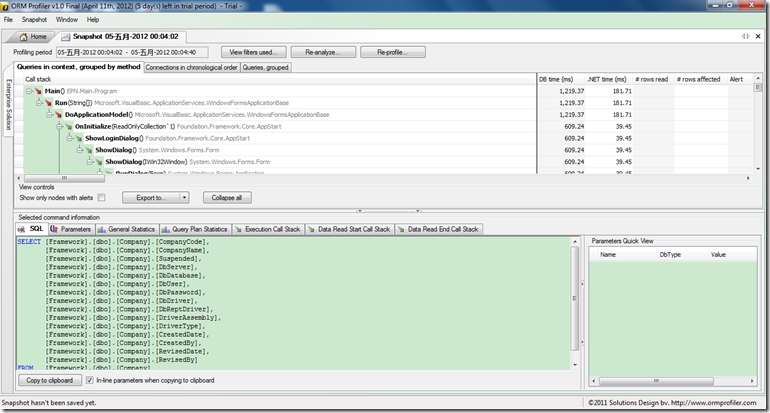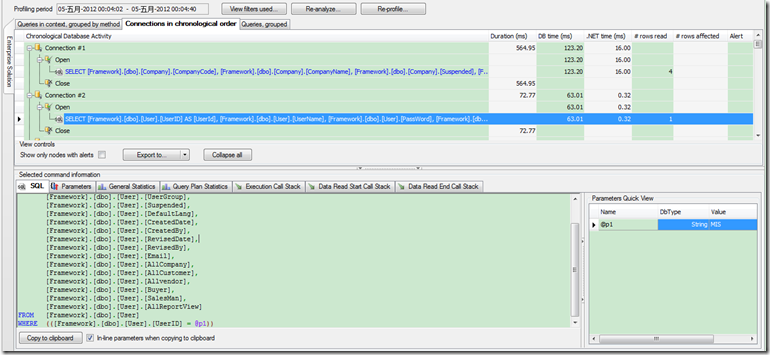应用LLBL Gen作为ORM框架访问数据库,数据读写不再与直接与SQL打交道。读取销售单代码看起来是这样的
public SalesOrderEntity GetSalesOrder(System.String RefNo, IPrefetchPath2 prefetchPath, ExcludeIncludeFieldsList fieldList) { SalesOrderEntity _SalesOrder = new SalesOrderEntity(RefNo); using (DataAccessAdapterBase adapter = GetCompanyDataAccessAdapter()) { bool found = adapter.FetchEntity(_SalesOrder, prefetchPath, null, fieldList); if (!found) throw new Foundation.Common.RecordNotFoundException("Invalid Sales Order"); } return _SalesOrder; }
在界面层,以下面的代码读取销售单
public override EntityBase2 LoadEntity(string customerNo) { ISalesOrderManager manager = ClientProxyFactory.CreateProxyInstance<ISalesOrderManager>(); IPrefetchPath2 prefetchPath = new PrefetchPath2((int)Foundation.CustomerServices.EntityType.SalesOrderEntity); prefetchPath.Add(SalesOrderEntity.PrefetchPathSalesOrderDetails); SalesOrderEntity customer = manager.GetSalesOrder(customerNo, prefetchPath); return customer; }
虽然这样大大简化了数据库访问方法。但同时,也带来一些不方便的地方。比如,因为ORM是以动态SQL的方式,产生SQL语句,以参数传递的方式,无法追踪到最终发送到SQL Server服务器的原始的SQL语句。其次,ORM产生的行为,与拼凑SQL有些不同。
例如,SalesOrderEntity order=new SalesOrderEntity();
order.Description=null; => 产生的SQL是SalesOrder.Description is NULL
order.Description=string.Empty; => 产生的SQL是SalesOrder.Description=’’
也就是NULL和空字符串,是不同的含义。这种情况,在追踪SQL查找问题时,极不容易察觉。
在没有发布ORM Profile之前,要跟踪LLBL产生的SQL,需要对配置文件作如下的设置,应用标准的.NET Trace机制
<system.diagnostics> <!-- LLBLGen Trace Trace Level: 0 - Disabled 3 - Info 4 - Verbose <switches> <add name="SqlServerDQE" value="0" /> <add name="ORMGeneral" value="0" /> <add name="ORMStateManagement" value="0" /> <add name="ORMPersistenceExecution" value="0" /> </switches> <trace autoflush="true"> <listeners> <add name="textWriterTraceListener" type="System.Diagnostics.TextWriterTraceListener" initializeData="e:\erp\erp_log.txt" /> </listeners> </trace> --> </system.diagnostics>
这种方法,将LLBL Gen生成的SQL 写到文本文件,用于诊断产生问题的SQL语句。
借助于.NET 标准的Trace机制,我重写了这样的跟踪,把LLBL Gen产生的SQL发送到指定的程序窗口中,代码如下
public class ORMTraceListener : TraceListener { static Socket m_socClient; static bool m_server=false; static ORMTraceListener() { m_server = false; OnConnect("127.0.0.1", 8221); } public override void Write(string message) { if (!String.IsNullOrEmpty(message) && m_server&&NeedSend(message)) OnSendData(message); } public override void WriteLine(string message) { if (!String.IsNullOrEmpty(message) && m_server && NeedSend(message)) OnSendData(message+Environment.NewLine); } }
经过这样的设置,我们追踪到的伪SQL,看起来像这样
Generated Sql query: Query: SELECT [Enterprise].[dbo].[User].[UserID] AS [UserId], [Enterprise].[dbo].[User].[UserName], [Enterprise].[dbo].[User].[PassWord], [Enterprise].[dbo].[User].[UserGroup], [Enterprise].[dbo].[User].[Suspended], [Enterprise].[dbo].[User].[DefaultLang], [Enterprise].[dbo].[User].[CreatedDate], [Enterprise].[dbo].[User].[CreatedBy], [Enterprise].[dbo].[User].[RevisedDate], [Enterprise].[dbo].[User].[RevisedBy], [Enterprise].[dbo].[User].[Email], [Enterprise].[dbo].[User].[AllCompany], [Enterprise].[dbo].[User].[AllCustomer], [Enterprise].[dbo].[User].[Allvendor], [Enterprise].[dbo].[User].[Buyer], [Enterprise].[dbo].[User].[SalesMan], [Enterprise].[dbo].[User].[AllReportView] FROM [Enterprise].[dbo].[User] WHERE ( ( [Enterprise].[dbo].[User].[UserID] = @UserId1)) Parameter: @UserId1 : String. Length: 10. Precision: 0. Scale: 0. Direction: Input. Value: "MIS".
这不能用于查询分析器中直接执行,必须经过转化。
这样已经很接近于ORM Profile的目标了,官方推出的ORM Profile工具,对上面的目标进行更优化的设计。
要让你的程序启动SQL跟踪,只需要在程序启动的地方,加入如下的语句
SD.Tools.OrmProfiler.Interceptor.InterceptorCore.Initialize("Enterprise Solution");
也可以反射调用上面的语句以启动SQL跟踪。在帮助文档中有代码,这里拷贝一份供您参考。
// Thanks to Craig Stuntz private static void StartProfiler() { if (AppSettings["ORMProfiler"] == "1") { System.Reflection.Assembly ormInterceptor = System.Reflection.Assembly.Load("SD.Tools.OrmProfiler.Interceptor.EFv4"); Type interceptor = ormInterceptor.GetType("SD.Tools.OrmProfiler.Interceptor.InterceptorCore"); interceptor.InvokeMember("Initialize", System.Reflection.BindingFlags.Public | System.Reflection.BindingFlags.InvokeMethod | System.Reflection.BindingFlags.Static, null, null, new[] { "My.Web" }, System.Globalization.CultureInfo.CurrentUICulture); } }
反射可以减少程序集编译时的依赖,您只需要将下面的程序集复制到被跟踪的应用程序目录中即可
- SD.Tools.OrmProfiler.Interceptor.dll (or for EFv4: SD.Tools.OrmProfiler.Interceptor.EFv4.dll)
- SD.Tools.OrmProfiler.Shared.dll
- SD.Tools.BCLExtensions.dll
- SD.Tools.Algorithmia.dll
这样,当前程序由LLBL Gen产生的SQL就会发送到ORM Profile主窗体中,以用于分析。
相对于问题查找,经常用到的是第二个选项卡Connections in chronological order
它显示了数据库连接和发送的SQL语句。这里可以看到,ORM Profile不仅仅可以追踪SQL,还可以用于性能分析。比如这一句SQL,它返回了四笔数据,DB读取时间是123.20ms。在下面的面板中,可以看到对SQL的各种分析。在SQL面板中,它显示的SQL,与上面的相似。如果你想把这个SQL拷贝到查询分析器中,结果如下
SELECT [Framework].[dbo].[User].[UserID] AS [UserId], [Framework].[dbo].[User].[UserName], [Framework].[dbo].[User].[PassWord], [Framework].[dbo].[User].[UserGroup], [Framework].[dbo].[User].[Suspended] FROM [Framework].[dbo].[User] WHERE (([Framework].[dbo].[User].[UserID] = 'MIS' /* @p1 */))
看到,这个工具已经将参数直接填充到SQL语句中,在查询分析器中可直接执行,不作任何修改。
ORM Profile把每一次跟踪会话叫做Snapshot,SQL文档中,将这个词语翻译为快照,可理解为一个跟踪会话,它可以保存在硬盘中,以便于再次分析。
对于Win Froms程序,在Main方法中调用Initialize,WPF程序,则在重写的应用程序OnStartUp中调用Initialize,Web应用程序,在Global.asax中的Application_Start方法,调用Initialize。
在实际产品中,Profile会产生性能损耗,占用额外的内存和发送字节到ORM Profiler主程序中。在调用InterceptorCore.Initialize方法之后,跟踪就开始。我们可以用方法
InterceptorCore.DisableMessageSending(); 停止跟踪
也可再次启用跟踪,应用下面的方法
InterceptorCore.EnableMessageSending();
如果不希望每次都打开ORM Profile来拦截SQL跟踪到的消息,我们可以在代码中,把SQL跟踪直接保存到文件中,在需要时,用ORM Profile打开跟踪文件,以进行分析。下面的代码来自于帮助文件,供您参考
// default ctor call, no filters, default analysis settings. You can specify filter settings and // analysis settings in an overload of the ctor. var snapshot = new Snapshot(); snapshot.Record(); // execute database activity here. // … // make sure the interceptor has flushed all messages over the named pipe. InterceptorCore.Flush(); // messages arrive on another thread, so we have to wait here before all messages have arrived Thread.Sleep(200); // after the pause, we can stop recording. snapshot.Stop(); // if you’ve specified filter settings in the ctor call, you have to do the following: snapshot.ApplyFilters(); // if you want to perform analysis in code prior to saving the snapshot, you should // uncomment the following line. NOTE: requires license file to be present. // snapshot.ApplyAnalysis(); // the snapshot can now be saved: string error=string.Empty; snapshot.SaveToFile(filename, out error);
ORM Profile工具相当灵活,可用于编程以集成到自己的产品中,为你的系统稳定,性能提升添加高效率的工具。

